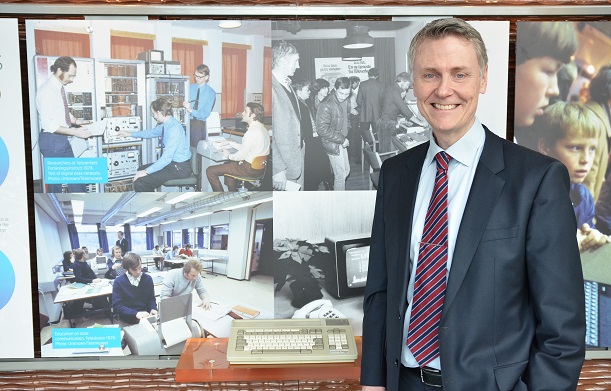Fifty years ago, amid the year of the Summer of Love, the Six Day War, iconic albums from The Beatles, The Rolling Stones and The Velvet Underground, Telenor Research launched its first project.
The department was then part of the Telegraph Service, the government owned and funded phone company. Bjørn Taale Sandberg, today’s Head of Research for Telenor Group, says: “The big challenge in the first years was to deliver basic fixed line telephony to everybody. The existing analogue system was swamped and getting a dial tone could be a real challenge.”
The unit also turned its attention to the horizon, with early work focusing on the maritime satellite communications that were essential for Norway’s large merchant navy and oil installations across the North Sea.
Today things are slightly different. Barely a week goes by without operators and vendors announcing the latest trials, innovations and breakthroughs across LTE, 5G, the Internet of Things, virtualisation and on and on it goes.
Sandberg says its focus today is threefold: “[To] support Telenor Group by building knowledge in key areas, attempting to address some of the most difficult to answer questions facing the company/industry and help Telenor deliver on its mission to empower societies by publishing and help bring forth new knowledge and insights.”
He adds: “In terms of stuff we are working on, important areas are how to realise the 5G vision, understanding our customers – specifically the digitial frontrunners, and AI to name a few.”
At the start of 2017, Sandberg identified AI, 5G and the IoT as the three big focus areas for the unit this year.
He says the main opportunity for AI is within network analytics and customer facing applications. However, its reach will grow outwards as other technologies come into play, whether 5G or the Internet of Things. He adds: “These technologies will be key to digitisation of not only telecoms, but society at large in the next 5-10 years.”
The operator funds an AI research lab where it works with the Norway University of Science and Technology. Telenor supplies data sets and set challenges to students, as well as advises them on research work. He adds: “That said, the lab is open to partners that contribute with data, problems and resources and we hope it will grow into a national or even European powerhouse in AI research and development.”
On the IoT, it is giving start-ups access to a LoRa network as well as sharing free hardware starter kits to students.
However, Sandberg says work continues on LTE, specifically on the orchestration of virtualised services and making the core of LTE 5G ready through the emerging kinds of technology like New Radio. He adds: “LTE has steam left and the ‘transition’ to 5G may look less like a complete network swap and more like a gradual replacement.”
Curiously, Telenor is different to other operators in how its technology strategy is organised. Usually trials fall under the aegis of the Chief Technical Officer, but here Research is very much separate and under Sandberg’s wing. The implementation of this new technology is the remit of Group CTO Ruza Sabanovic.
Sandberg describes her as “our most important internal customer” – she also sits on the governing board of the unit. He says: “We cooperate and coordinate pretty closely. At the moment we are heavily involved in the 5G work going on in the group. Typically researchers are involved in concrete pilots and even procurement projects early on when knowledge transfer is key. Many of the engineers in the CTO organisation also joined from Telenor Research, so we complement each other nicely.”
But what of the longer-term? What does Sandberg think he and his team will be focusing on in 2027? He says: “Good question – and I am probably wrong, but my guess is we will be working on 6G still and I don’t think the AI boom will be over. We will certainly be doing user research to understand trends among our customers. That is ever important and will remain a focus as long as the company exists.”
Whatever it will be, it will be a long way from traditional telephony.





